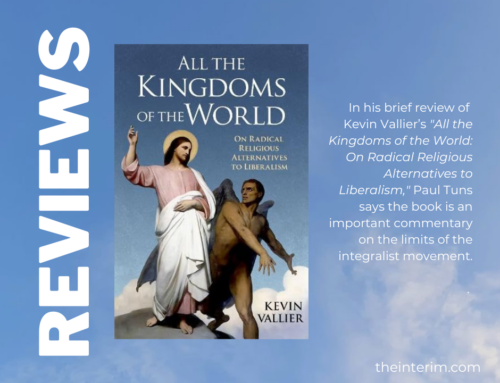During her June 6 speech before the House of Commons cast a foreign policy reset for Canada, Global Affairs Minister Chrystia Freeland declared that abortion access and “sexual reproductive rights” are “at the core” of Liberal foreign policy under Prime Minister Justin Trudeau.
Extrapolating on her statement, Freeland, who replaced Stephane Dion as foreign minister in January, said Canadian values include “feminism and the promotion of the rights of women and girls.” Reiterating policy priorities that were announced twice earlier this year, Freeland emphasized, “that includes sexual reproductive rights. That includes the right to safe and accessible abortions.” She stated, “these rights are at the core of our foreign policy.”
Freeland insisted promoting abortion and comprehensive reproductive and sexual health will lead to a “safer and more prosperous” world.
The speech was widely seen as a rebuke of Donald Trump’s foreign policy which includes reinstating the Mexico City policy of not funding abortion abroad. It also championed multilateral institutions like the United Nations and climate change treaties such as the Paris Accord from which the Trump administration had recently withdrawn.
Freeland said Ottawa will not be afraid to try to impose its values on the rest of the world. “Canadian liberalism is a precious idea,” she said. “It is our role to set a standard for how states should treat women, gays and lesbians, transgendered people, racial, ethnic, cultural, linguistic, and religious minorities, and of course, indigenous people.”
Freeland said the government would soon unveil Ottawa’s “first feminist international assistance policy, which will target the rights of women and girls as well as gender equality.”
Three days later, Marie-Claude Bibeau, Minister of International Development and La Francophonie, launched the new Feminist International Assistance Policy. The Global Affairs announcement stated, “Canada’s Feminist International Assistance Policy recognizes that supporting gender equality and the empowerment of women and girls is the best way to build a more peaceful, inclusive and prosperous world.” The first commitment the FIAP makes to health care is to abortion, vowing to “work to close persistent gaps in sexual and reproductive health and rights for women and girls,” where “Canada will support increased access to a full range of health services, including family planning and modern contraception; comprehensive sexuality education; safe and legal abortion, and post-abortion care.”
This appears to be the formal plan to implement the March 8 (International Women’s Day) announcement by Prime Minister Justin Trudeau that his government would provide $650 million to fund and promote abortion, reproductive health, and sexual education around the world, including lobbying foreign governments to liberalize their abortion laws.
The FIAP was seen in action through the Global Affairs Canada announcement on July 5 regarding the humanitarian crisis in the Democratic Republic of Congo (DRC). In a part of Africa where 87 per cent of people live on less than $1.25 a day and there are more than 3 million refugees, Canada has identified children having “little access to sexual and reproductive health services” as a vital concern. Ottawa said FIAP would increase “women’s and girl’s access to the full range of sexual and reproductive health services” in the DRC ahead of its commitment to provide “life-saving humanitarian assistance to over 578,000 conflict-affected people” in the region.
Matt Wojciechowski of Campaign Life Coalition, said these new priorities are “at odds with many developing countries and member states at the United Nations who don’t share Trudeau’s ‘value system’.” He said “the Liberals’ arrogance in pushing this culture of death around the world is unbelievable. They are blatantly engaging in ideological colonization, something the leader of Trudeau’s faith, Pope Francis, has denounced many times.”
The Canadian Conference of Catholic Bishops denounced Freeland’s speech, condemning her equating “women’s rights with the right to abortion,” stating that Canadians and people around the world are divided over the morality of abortion. Writing for the bishops, Bishop Douglas Crosby of Hamilton, president of the CCCB, said in his open letter, Candian foreign policy has traditionally focused on the admirable goals of “international peace, just order, free trade, foreign aid, and global stability.” Admitting that there are many women’s issues that ought to be addressed, Bishop Crosby insisted that abortion was not one of them. Noting that abortion can cause physical and psychological harm, “it is difficult to comprehend how the policy agenda you have advanced truly represents the interests of women, particularly those that are already at risk.”
Noting that people from many different religious and cultural backgrounds oppose abortion, Bishop Crosby asked Freeland “what ever happened to Canada’s longstanding tradition of respect for cultures, values, and histories, including different religious and moral traditions.” He warned that, “political ideology cannot be allowed to dictate foreign policy and to override common sense and our humanitarian responsibilities to those in dire need.” He juxtaposed the $650 million “to facilitate abortion advocacy and sexual reproductive rights on a global scale” to the comparably paltry $119.25 million Ottawa committed to severe food shortages in Nigeria, Somalia, Sudan and Yemen, a humanitarian crisis described by the United Nations as the worst the world has seen since the end of World War II.






